- Home
- J. D. Robb
Bump in the Night Page 28
Bump in the Night Read online
Page 28
“Right. I . . . you . . .” She flushed again, profoundly disconcerted that he knew her so well. All of her, so well. He smiled at her kindly.
“I’m not your conscience, Charlotte. I don’t judge your fantasies or evaluate the legitimacy of your dreams or wishes. To me, they simply are what they are. I wouldn’t exist without them.”
“So why aren’t you more like a hologram or a ghost or something then? If you’re just a bunch of my memories and thoughts and . . . and desires. Why do you seem so real to me?”
“Because I am real to you.” When he could see she still didn’t quite grasp it, he took another track. He stopped and turned toward her. “Close your eyes.”
“No. What if someone sees me standing here alone, in the middle of the sidewalk, with my eyes closed? You might as well hang a Mug Me sign on my back.”
“Okay. Over here then, behind this potted shrub. Lean back against this building and close your eyes like you’re just catching your breath. This’ll only take a second. Close them and don’t peek.”
She leaned her head back against the brick wall and did as he told her. Immediately, she smelled bacon and could hear it sizzling in a pan.
More magic.
“Mmm. We love bacon, don’t we, Charlotte?” She nodded blindly. “You want a bite?” She nodded again—in for a penny. “Open your mouth, then open your eyes.”
She did both, only to find his fingers empty. She snapped her lips shut.
“Disappointed.” He identified her primary emotion as he smoothed the backs of his knuckles slowly down her left cheek. “But you get the idea. The smell and the sound, they weren’t real either. But your memories of them are strong enough to make your mouth salivate. Your desire to believe made the bacon real enough for you to open your mouth for it. Just like your desire to believe that someone like me exists makes me real enough for you to feel my fingers on your cheek.”
It was a heavy concept inside her head, like God and black holes and why glue doesn’t stick to the inside of the bottle. Things she accepted on faith alone. Her temples were starting to throb. It was more than she could assimilate all at once.
She pushed away from the building and started for home again. She needed to think . . . alone.
“You know,” he said, dropping casually into step with her—seeming as comfortable out of her head as he was, apparently, inside it. “Maybe we could stop and buy a GQ magazine on our way home. We could browse through, see if I’m a shirt-and-tie guy, or more like a Marlboro Man, huh? We could pick up a Glamour and Cosmopolitan, too. I’m very in touch with your feminine side but it doesn’t hurt to stay current. Tomorrow we can do some shopping and maybe—”
“Hey,” she said, cutting him off as she spotted Mrs. Kludinski getting out of a car in front of their building. Her neighbor turned and bent at the waist to speak to the driver, with one small shopping bag in hand. “Don’t start making a lot of plans, okay? Especially the we kind. I’m not sure I like you. I’m not sure I want you around. I’m not even sure I’m really awake here, so back off. Go . . .” She flipped her fingers as if to shoo away a fly. “Go . . . wherever you go when you’re not around. I need to think.”
“About me?” he asked smugly. Then she recalled she had to stop thinking about him to get rid of him. “Don’t worry, Charlotte, Mrs. Kludinski can’t see me, remember?”
“I can see you,” she said through her clenched teeth, barely ten feet from her neighbor.
He hastened his pace to the front of the car and groaned. “It’s Lacey. Looks like her husband bought her another new car. Brace yourself, sweetheart.”
“Charlotte.” Mrs. Kludinski caught sight of her and straightened out of the car with a smile. The elderly lady had been a widow for as long as Charlotte could remember. Social and friendly, she’d always made her feel like a special friend.
“Hi, Mrs. Kludinski. If this is Tuesday, that must be Lacey. Did you have a nice afternoon? Is this a new car?” She stepped into the street and over to the open car door. “Hello, Lacey.”
A year behind Lacey Kludinski in school, Charlotte always thought her dark good looks were exotic rather than uncommonly beautiful. She was a popular cheerleader in high school and married a young doctor the year after she graduated from college with a degree in interior design—which she used solely to decorate her own home on Bainbridge Island. She was and had everything Charlotte wasn’t and didn’t—and couldn’t be happier about it. Or more vocal about it.
“Oh, hi, Charlotte. Don’t you just love it? Come feel this, real leather on these seats. Soft as butter. Sad thing is, we’ll just have to trade it in next year for another new car because the humidity out on the Island is so hard on cars, you know. I swear, if I hadn’t married a doctor, I don’t know how we’d keep up with everything. It’s just one thing after another, I’m telling you. So, how are you? Seeing anyone special yet?”
Charlotte smiled at her. Something inside her always wanted to think the best of Lacey. Really. She’d always been so nice to her aunt—tins of cookies and brownies in high school, Tuesday afternoon lunches and shopping trips since then. Lacey had a good side. Somewhere.
“What. A. Boob.” Mel placed two big, hot hand prints on the shiny hood of Lacey’s new car.
“I’m fine and no I’m not,” she said quickly, thinking she should go inside before Mel did something embarrassing. “I mean, I’ve been sort of busy and . . .”
“Her father passed away last week,” Mrs. Kludinski injected.
“That’s right. You told me. I’m sorry, Charlotte.”
“Thanks.”
“I bet she’s wishing her aunt would take the hint and follow him.” Mel stuck his finger in his mouth, wetting it, then doodled on the hood with it. “Your father was right about her being a gold digger, you know. She wouldn’t give this nice old lady a bucket of bad luck, if she couldn’t pay for it.”
“All the more reason to keep your eyes open for a good catch,” Lacey said, diligently. “I still think you ought to let me look into hooking you up with someone from my husband’s hospital. He knows several male nurses, and most of them aren’t even gay. A couple of them don’t even act gay. You don’t want to end up old and alone, do you?”
“Like your aunt, you twit?” But even before Mel said it, Charlotte felt the slightest stiffening in Mrs. Kludinski’s posture and felt bad for her. Felt bad for them both really.
“There are worse things than old and alone, Lacey, but . . . thanks. And I will keep my eyes open. You drive safe now.” She turned, stepped back onto the sidewalk and walked over to the steps of her building while Mrs. Kludinski said good-bye. Mel joined her, a derisive scowl on his magnanimous face.
The three of them watched the big, silver-colored Cayenne drive away.
“Well, her brain is the size of a pea and her heart is even smaller,” Mrs. Kludinski announced as she turned around. “But she’s real careful with her big fancy cars so she’s a good, safe driver and she’s cheaper than a taxi. Besides, I just wouldn’t feel right about leaving her all my money if I didn’t think she’d earned at least part of it. Wouldn’t be good for her character.”
Charlotte chuckled silently. The old woman started up the four shallow steps and Charlotte followed her . . . and Mel followed her, ignoring her scowl and the hand she kept waving him away with.
“Sounds to me like Lacey’s getting a pretty good deal.” She stepped around the elderly lady, used her key to open the main door for her. “The two of you always seem to have a good time together. There are harder ways to earn money.”
Charlotte scooted in after her, pushing the door closed behind her, locking him out. She glanced through the frosted glass in the door, turning completely around when she couldn’t see him, to check the sidewalk in both directions. He was gone.
Four
“Oh no,” she murmured softly, feeling mean and sorry and afraid she’d never see him again. Which would be for the best, right?
“What is it? Are
you all right, dear?”
“Yes.” She sighed, miserable. “I’m fine. I think I may have just done something truly awful and I’m not sure how to . . . if I want to . . .” Mrs. Kludinski looked concerned. “Never mind. I’ll figure it out.”
“Long day?”
“Incredibly.”
“Can I help?”
Impulsively, she passed her briefcase to her other hand, then looped her arm around her frail shoulders and gave the old lady a quick peck on the cheek. “Thanks. But I’m okay.”
“Yes, you are.” She patted Charlotte’s cheek with arthritic fingers and headed for the door of her first-floor apartment. “But if you need anything, call me.”
“I will.” She waited for her to go inside then turned to take the stairs to the second floor.
“Don’t say you didn’t miss me.”
Mel grinned at her from the middle of the staircase.
“How long have you been there?”
“Since you locked the door on me.”
“So you can walk through walls? Like a ghost?”
“Not exactly.” His expression grew guarded. So, naturally, she said, “Explain.”
With a belabored expression he got to his feet and let her by. “You didn’t want me with you, but you didn’t stop thinking about me, either. I didn’t leave; I just got out of your way.”
“Then get out of it again because I’m exhausted and I need to think . . . and you’re a distraction.”
“I can help you think. Two heads are better than one, right?”
“If I have this straight so far, you and I share a mind, so trying to solve a problem from two different heads might be a little tricky.”
“Not really. You do it all the time. All those little mental debates.” He stopped on the first landing and cupped both hands to his right. “Shall I have chicken or fish for dinner?” He moved his hands to the left and spoke at them in a slightly higher voice. “I feel like eating fish but the chicken is already thawed.” Back to the right and the lower voice. “The chicken will be fine in the frig until tomorrow and I can nuke the fish in the microwave.” Left. “Tomorrow I pick up the monthly receipts for Tops Chinese and they always send moo shoo pork home with me.” Right. “I don’t think it would be wise to risk that chicken on Thursday.” Left. “That’s okay, I can feed it to Mel and—” He gasped. “Charlotte!”
He sent a comically wounded look up the stairs and made her laugh. Taking steps two at a time he came to her side. She looked at him thoughtfully as little tumblers rolled back and forth in her brain.
“So . . . you can’t really read my mind. You don’t know what I’m going to say or think until I say or think it. You’re on like a . . . a six- or eight-second delay, aren’t you?”
“I love smart women.” He started up the steps again. “I really do. Most smart men love smart women, as a matter of fact. That just makes sense, doesn’t it? I told you there was nothing wrong with being smart.”
“So I’m right,” she said, following, recalling a short phase in her life when she’d actually pretended to be less intelligent to boost male egos. “And I bet there’s some way to turn you off and on, too, isn’t there?”
“In what sense? I have to admit that this sudden aversion to thinking in my presence is a definite turnoff for me. It would be for any man. But as to turning me on . . .” He slipped her a sizzling glance and she tripped on the next step. It amused him. “We’ve already discussed that.”
“I meant off and on like a light bulb. You come, you go. You’re here, you’re gone. That’s me too, right?”
“I am all you, babe.” She squinted at him. “You, babe? Get it? Sonny and Cher?”
“I get it. I don’t like it. I don’t like being called sweetheart, either. You called me that earlier.” She took her keys out of her coat pocket again and stopped at her apartment door. “Names like that annoy me.”
“I know. But that’s only because you hear them most often from old people and jerky men you don’t know. But now you know me, and I’m not a jerk, so I’m testing endearments. There has to be one you like.”
“Why?”
“Because they’re one of the many components of the affection you crave. Once we find one that doesn’t trigger a full-scale feminist reaction inside you, we can begin a desensitization program.”
She sighed and lean against the door. “I have one more question.” He pressed his shoulder to the door next to her and waited for it. He was a large presence and standing so close to him made her feel . . . not smothered, not intimidated, just . . . really good in a way she couldn’t explain. Safe, maybe. “Why now? Why are you here now?”
“Because you need me now.”
“For what?”
He glanced around as if the answer might be written on one of the walls, then looked straight into her eyes. “I’m not sure. We’ll figure that one out together.”
She could have stood there and looked at him for the rest of her life. His features were neither pretty nor beautiful; their appeal lay in the expressions that changed as often and diversely as his thoughts. An honest face. A trustworthy face.
He smiled suddenly and startled her. She turned quickly to unlock the door, then stopped.
“I actually have two last questions.” He didn’t seem surprised. “The second one is . . . will the man I fall in love with be exactly like you? Is that how I’ll recognize him?”
“I don’t know.” She frowned and he held out the arm he wasn’t leaning on. “I only know what you know, Charlotte, but . . . someone exactly like me would be perfect,” he said without ego. “Perfect can be hard to live with. There would be no give and take of opinions, no surprises, no compromising. No growth. No friction, no push and pull. I think we’re looking for someone almost like me, with as many of my strengths and virtues and attributes as possible. You’ll feel comfortable with him. You’ll sense parts of me in him. I think that’s how you’ll recognize him.” He paused. “You gonna open the door now?”
“As soon as you leave.”
He shook his head slowly. “Can’t leave. Not while you’re thinking of me.”
“Then get out of my way again.”
He backed away from the door. “Where am I supposed to go?”
“How would I know? Use your own imagination.”
“Very funny. You want me to stand here in the hall all night?”
“I just want to be alone for a while. To think. To sort this out.” She opened the door, went inside, then turned and blocked his entry. “I’m sorry.”
He didn’t look pleased and she thought he might argue, but all he said was, “I’m here for you.”
She nodded, gave him a small apologetic smile and closed the door. Then turned to face the empty apartment with a heavy sigh. Alone sucked immediately.
She knew loneliness. Even before her few good friends got married, with her father still healthy and around all the time, there had been an underlying loneliness for as long as she could remember. She was simple and quiet and plain and so was her life for the most part. But now, she was alone and lonely and the difference overwhelmed her. Crushed her.
There was a soft knock on the door behind her. She looked through the peephole at him.
He smiled and waved. “You can change your mind and let me in. I’m good company.”
“You’re also a distraction. I need to think.”
“I won’t make a sound.”
“No. Now leave me alone.”
She dropped her briefcase and purse on the table beside the door, hung up her coat and went to the kitchen to cook the chicken she didn’t feel like eating . . . also alone.
She had to face the facts. She was in deep trouble if she was resurrecting imaginary companions from her childhood. And while she was reluctant to give him any credit for his thinking, he was right about one thing: It was time to make some changes in her life. Big ones. Huge ones. Drastic ones.
It wasn’t like it was a new concept to her; she’d
been thinking about it, dreaming about it for years. It wasn’t that she didn’t want to change. She did, more than anything. So, what held her back?
As she thought about it, there came another knock on the door. She went to the kitchen doorway and stared across the room at it—decided to ignore him. A few seconds later, he called through the door, “Courage and self-confidence. That’s all you need. And a plan. I can help you with the plan. I have some really great ideas.”
“Stop bothering me!”
He was gutsy and self-confident enough for both of them . . . and stubborn and annoying. Was he everything she wasn’t? No . . . that didn’t work. She made him, so . . . she was brave and bold, too . . . right?
She took a few salad fixings from the frig, closed the door with her foot and carried them to the sink.
So say she suddenly went nuts and changed her entire life around, did everything she wanted to do, when she wanted to do it. What would people say? They were used to her being the way she was. She was used to it. Would they treat her differently? Would she be a different person? Would it make her happy? Or make her feel foolish for even trying?
Who cares what other people think? You’re not changing for them; you’re changing for yourself. You don’t have to change your whole self, only what makes you unhappy, only what you want to change to make yourself happy. And why would you feel foolish for making yourself happy? Treat yourself better and other people will treat you better. That’s just logical . . .
She threw the paring knife and cucumber in the sink, marched out of the kitchen, through the open dining room and across the living room to shout at the closed front door.

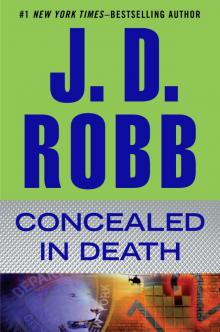 Concealed in Death
Concealed in Death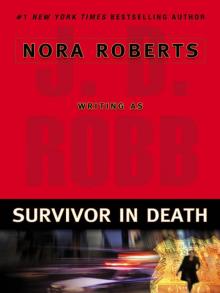 Survivor in Death
Survivor in Death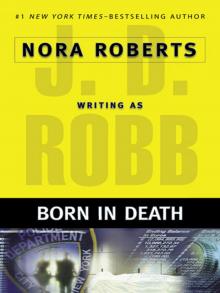 Born in Death
Born in Death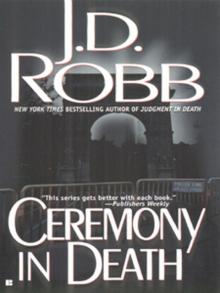 Ceremony in Death
Ceremony in Death Indulgence in Death
Indulgence in Death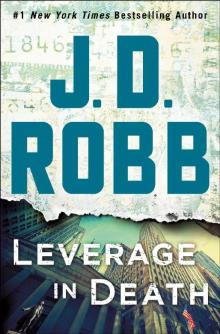 Leverage in Death
Leverage in Death Devoted in Death
Devoted in Death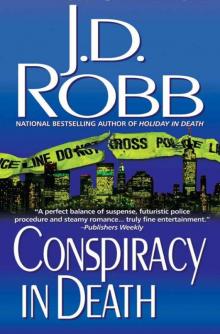 Conspiracy in Death
Conspiracy in Death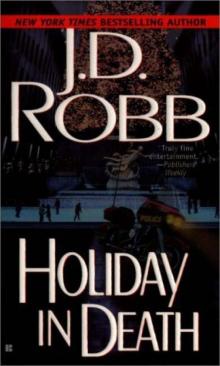 Holiday in Death
Holiday in Death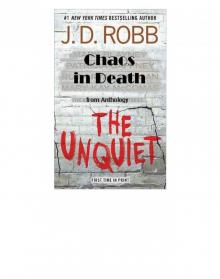 The Unquiet
The Unquiet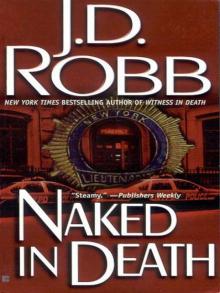 Naked in Death
Naked in Death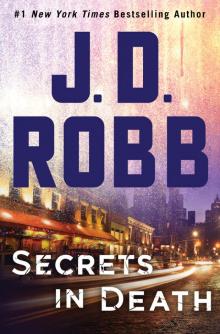 Secrets in Death
Secrets in Death Seduction in Death
Seduction in Death Strangers in Death
Strangers in Death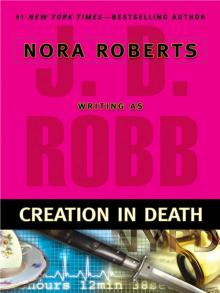 Creation in Death
Creation in Death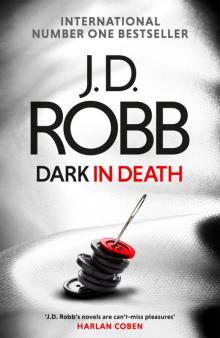 Dark in Death
Dark in Death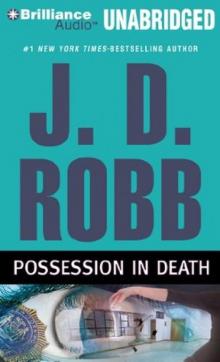 Possession in Death
Possession in Death Visions in Death
Visions in Death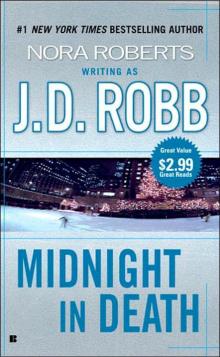 Midnight in Death
Midnight in Death Innocent in Death
Innocent in Death Vengeance in Death
Vengeance in Death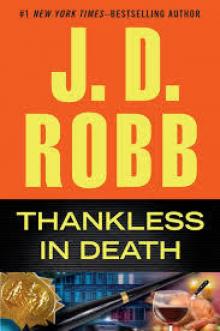 Thankless in Death
Thankless in Death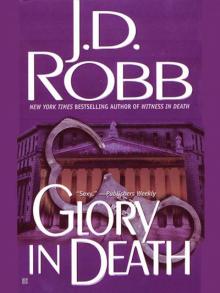 Glory in Death
Glory in Death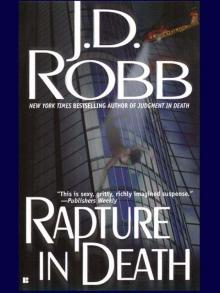 Rapture in Death
Rapture in Death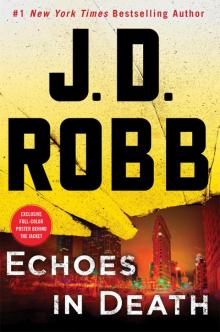 Echoes in Death
Echoes in Death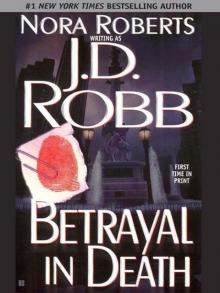 Betrayal in Death
Betrayal in Death Celebrity in Death
Celebrity in Death Immortal in Death
Immortal in Death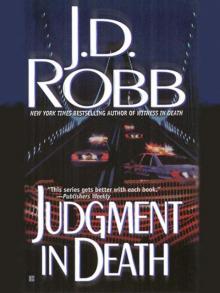 Judgment in Death
Judgment in Death Ritual in Death
Ritual in Death Portrait in Death
Portrait in Death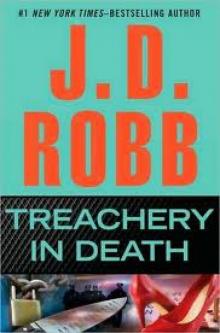 Treachery in Death
Treachery in Death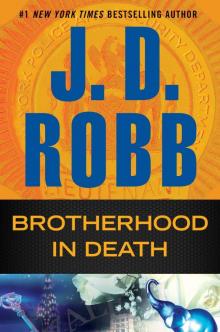 Brotherhood in Death
Brotherhood in Death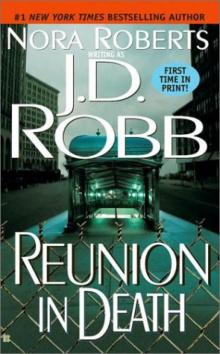 Reunion in Death
Reunion in Death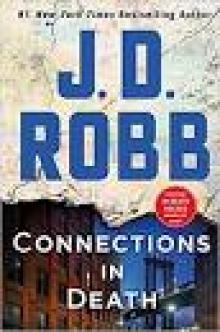 Connections in Death: An Eve Dallas Novel
Connections in Death: An Eve Dallas Novel Imitation in Death
Imitation in Death New York to Dallas
New York to Dallas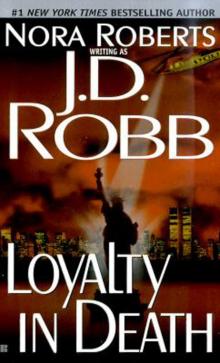 Loyalty in Death
Loyalty in Death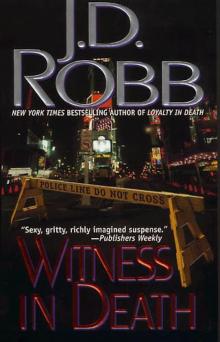 Witness in Death
Witness in Death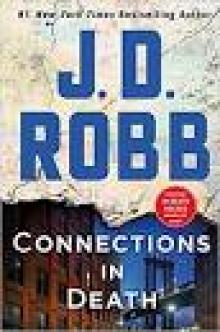 Connections in Death
Connections in Death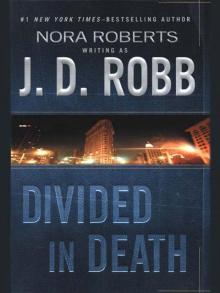 Divided in Death
Divided in Death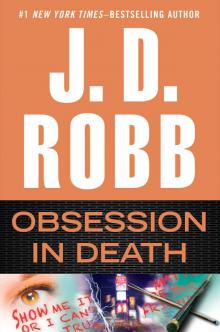 Obsession in Death
Obsession in Death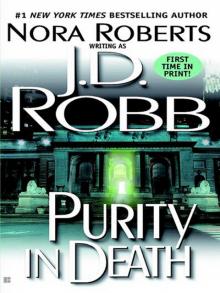 Purity in Death
Purity in Death Festive in Death
Festive in Death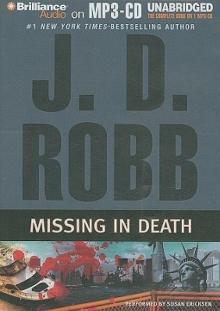 Missing in Death
Missing in Death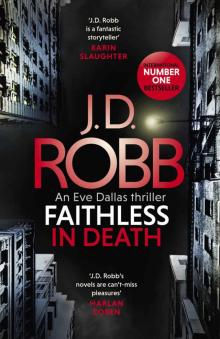 Faithless in Death: An Eve Dallas Thriller (Book 52)
Faithless in Death: An Eve Dallas Thriller (Book 52)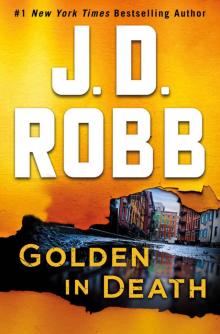 Golden in Death
Golden in Death The In Death Christmas Collection
The In Death Christmas Collection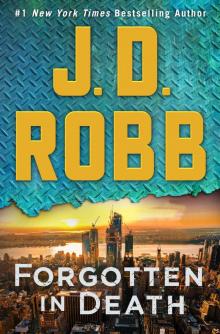 Forgotten in Death
Forgotten in Death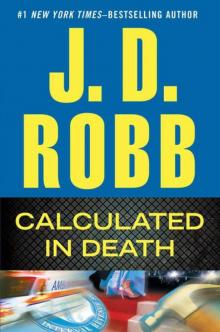 Calculated in Death
Calculated in Death Salvation in Death
Salvation in Death Interlude in Death
Interlude in Death Haunted in Death
Haunted in Death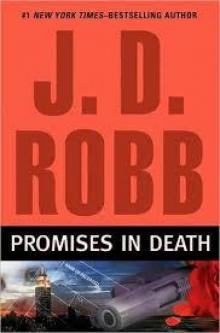 Promises in Death
Promises in Death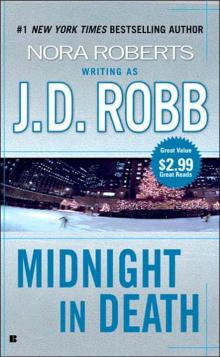 In Death 07.5 - Midnight in Death
In Death 07.5 - Midnight in Death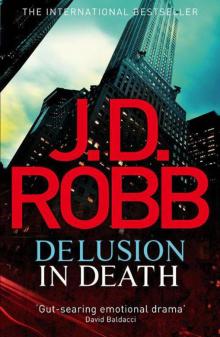 44 Delusion in Death
44 Delusion in Death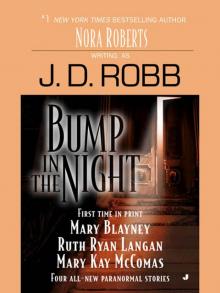 Bump in the Night
Bump in the Night The In Death Collection, Books 16-20
The In Death Collection, Books 16-20![[In Death 17] - Imitation in Death Read online](http://i1.bookreadfree.com/i/03/20/in_death_17_-_imitation_in_death_preview.jpg) [In Death 17] - Imitation in Death
[In Death 17] - Imitation in Death In Death 06 - Vengeance in Death
In Death 06 - Vengeance in Death Dead Of Night
Dead Of Night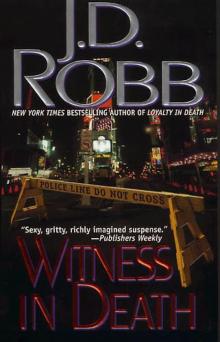 In Death 10 - Witness in Death
In Death 10 - Witness in Death![[In Death 16] - Portrait in Death Read online](http://i1.bookreadfree.com/i1/03/27/in_death_16_-_portrait_in_death_preview.jpg) [In Death 16] - Portrait in Death
[In Death 16] - Portrait in Death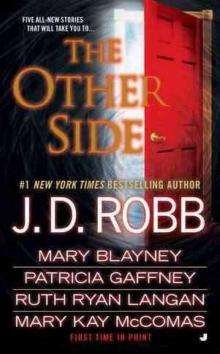 Possession in Death edahr-39
Possession in Death edahr-39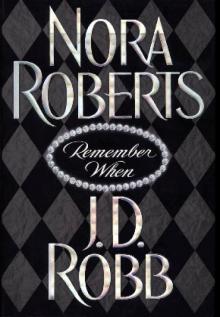 Remember When edahr-20
Remember When edahr-20 Big Jack
Big Jack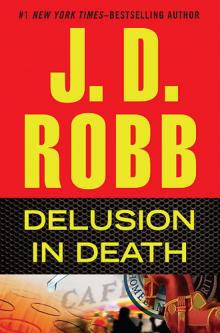 Delusion in Death edahr-44
Delusion in Death edahr-44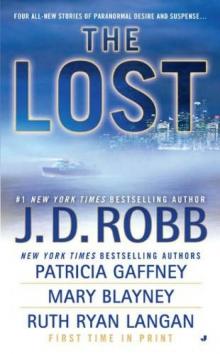 Missing in Death edahr-36
Missing in Death edahr-36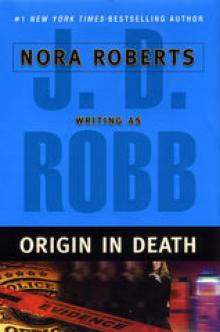 Origin in Death edahr-24
Origin in Death edahr-24![[In Death 18] - Divided in Death Read online](http://i1.bookreadfree.com/i1/04/03/in_death_18_-_divided_in_death_preview.jpg) [In Death 18] - Divided in Death
[In Death 18] - Divided in Death The Lost
The Lost![[In Death 05] - Ceremony in Death Read online](http://i1.bookreadfree.com/i1/04/01/in_death_05_-_ceremony_in_death_preview.jpg) [In Death 05] - Ceremony in Death
[In Death 05] - Ceremony in Death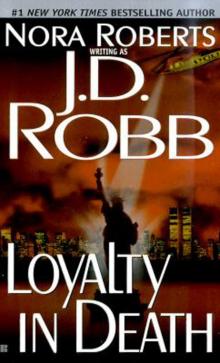 In Death 09 - Loyalty in Death
In Death 09 - Loyalty in Death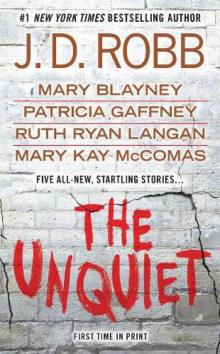 Chaos in Death edahr-42
Chaos in Death edahr-42 In Death 12.5 - Interlude in Death
In Death 12.5 - Interlude in Death![In Death [47] Leverage in Death Read online](http://i1.bookreadfree.com/i1/04/01/in_death_47_leverage_in_death_preview.jpg) In Death [47] Leverage in Death
In Death [47] Leverage in Death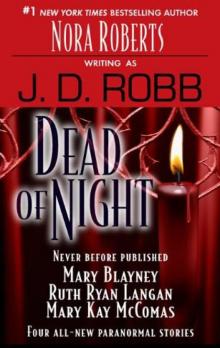 In Death - 24.50 - Dead of Night
In Death - 24.50 - Dead of Night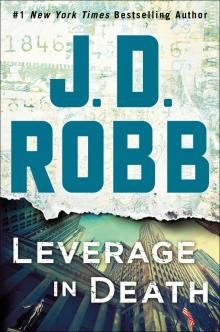 Leverage in Death--An Eve Dallas Novel
Leverage in Death--An Eve Dallas Novel![[In Death 24] - Innocent in Death Read online](http://i1.bookreadfree.com/i1/04/05/in_death_24_-_innocent_in_death_preview.jpg) [In Death 24] - Innocent in Death
[In Death 24] - Innocent in Death![[In Death 15] - Purity in Death Read online](http://i1.bookreadfree.com/i1/04/05/in_death_15_-_purity_in_death_preview.jpg) [In Death 15] - Purity in Death
[In Death 15] - Purity in Death The In Death Collection, Books 26-29
The In Death Collection, Books 26-29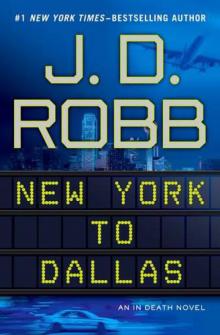 New York to Dallas edahr-41
New York to Dallas edahr-41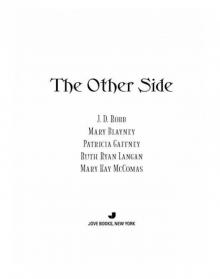 The Other Side
The Other Side The In Death Collection 06-10
The In Death Collection 06-10![[In Death 08] - Conspiracy in Death Read online](http://i1.bookreadfree.com/i2/04/05/in_death_08_-_conspiracy_in_death_preview.jpg) [In Death 08] - Conspiracy in Death
[In Death 08] - Conspiracy in Death The In Death Collection, Books 21-25
The In Death Collection, Books 21-25 Memory in Death edahr-25
Memory in Death edahr-25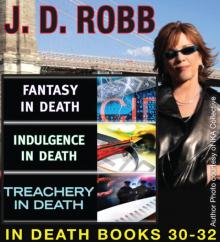 The In Death Collection, Books 30-32
The In Death Collection, Books 30-32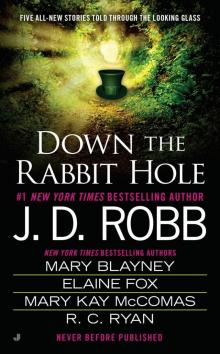 Down the Rabbit Hole
Down the Rabbit Hole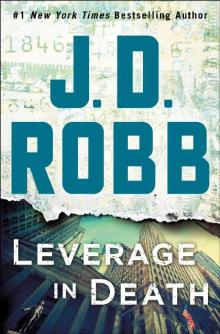 Leverage in Death: An Eve Dallas Novel (In Death, Book 47)
Leverage in Death: An Eve Dallas Novel (In Death, Book 47) The In Death Collection, Books 6-10
The In Death Collection, Books 6-10 The In Death Collection, Books 11-15
The In Death Collection, Books 11-15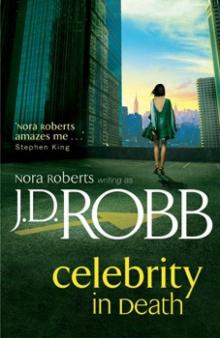 Celebrity in Death edahr-43
Celebrity in Death edahr-43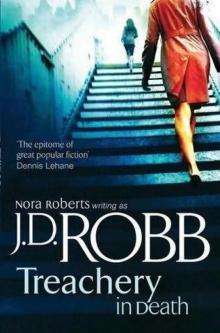 Treachery in Death edahr-40
Treachery in Death edahr-40![[In Death 12] - Betrayal in Death Read online](http://i1.bookreadfree.com/i2/04/13/in_death_12_-_betrayal_in_death_preview.jpg) [In Death 12] - Betrayal in Death
[In Death 12] - Betrayal in Death The In Death Collection, Books 1-5
The In Death Collection, Books 1-5